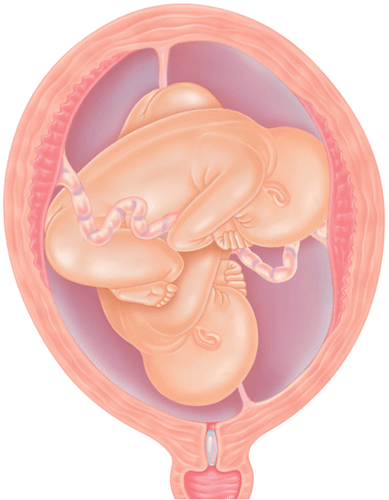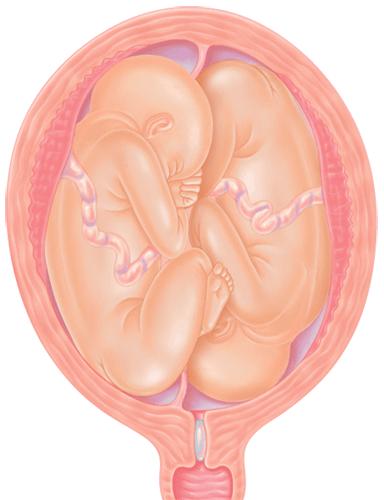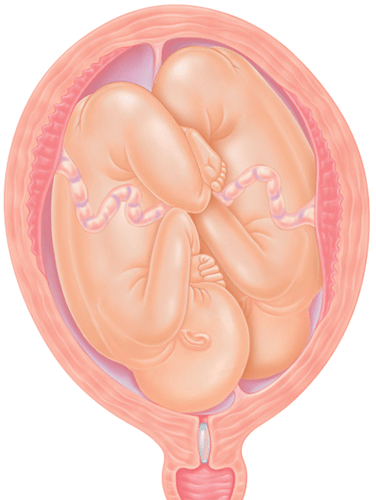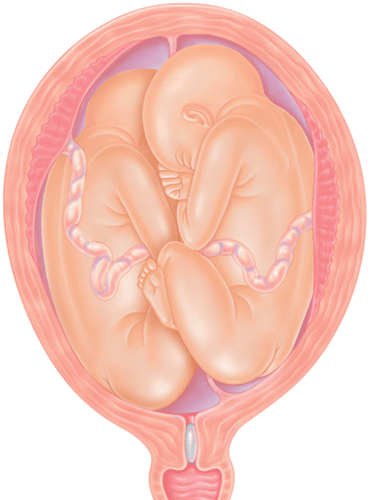Getting enough rest Taking it easy with twins or more
Your whole body
is under greater stress when carrying more than one baby. It's
important to recognize this and take sensible measures to ensure you get
plenty of rest.
Try to have some
time each day when you put your feet up. If you have other children,
try to arrange for someone else to take them for an hour so you can
relax.
Get to bed earlier in the evening to give your body a break.
When possible, get someone else to help out with household chores, cooking, and shopping.
NOTE
Being pregnant with twins means even more work for your body—so taking care of yourself is more important than ever
The position of twins How twins lie in the uterus
Twins can lie in a variety of
positions in the uterus and these positions can determine how your baby
will be born. One baby will always be lower than the other one, and this
baby will be known as the twin A—it is closer to the birth canal and
will generally be born first.
| Q: |
What are the possible positions?
|
| A: |
Babies can be in the head down position (cephalic) or buttocks
or feet first (breech). Occasionally a baby may be lying across you
diagonally, or horizontally (transverse). Twins can lie in any
combination including: cephalic-cephalic, cephalic-breech,
breech-breech, transverse-cephalic. These positions can change
throughout the pregnancy. As with a singleton pregnancy (one baby), once
the presenting baby closer to the cervix goes down into the pelvis, it
will stay in that position ready for birth.
|
| Q: |
Can I have a vaginal birth?
|
| A: |
When both of your babies are in a cephalic position your
obstetrician may offer you the chance to try for a normal labor and a
vaginal birth. Sometimes, the first baby is in a cephalic position and
the second twin is in a breech position. If this is the case, your
obstetrician may suggest that you have a cesarean right from the outset.
You can certainly actively participate in these discussions and it's
important to share your feelings about the birth and birth choices with
your doctor and delivery team. If the first baby is in a breech position
and the second baby is in a cephalic position, then it is highly likely
that your doctor will recommend that you have a cesarean delivery. If
both your babies are in the breech position, you will almost certainly
need a cesarean, as is the case if both babies are lying across you in
the transverse position.
|
A transverse twin:
If one baby is lying across in a transverse position, a cesarean
is likely to be recommended from the outset, especially if the babies
are large.

Head down/breech:
If one baby is head down and the other baby is breech, the likelihood of having cesarean section delivery is quite high.

Twins head down:
The most common position is for both twins to be facing head down
in a cephalic position, making a vaginal birth more likely.

Breech twins:
If both babies are facing head up in a breech position, you will
certainly be advised to have them delivered by an elective cesarean.

Myths and misconceptions Is it true that…
| Q: |
Morning sickness only happens in the morning?
|
| A: |
Another
myth is that morning sickness only lasts for the first three months.
This is untrue, and morning sickness doesn't happen only in the morning;
it can strike at any time of day or night.
It's known as morning sickness because an empty stomach can lead to
queasiness, and your stomach is usually empty when you wake up.
|
| Q: |
Having sex will hurt my baby?
|
| A: |
It's fine to
have sex in normal pregnancies. You may be advised to avoid sex if
you're high risk (if you've suffered frequent miscarriages or there is a
danger of early labor) but generally, sex is fine throughout.
Your unborn baby is protected by the uterus, amniotic fluid, layers of
muscle tissue, and pelvis, and won't be able to feel your partner's
penis—so there is no need for dads to feel squeamish!
|
| Q: |
Your baby recognizes your voice?
|
| A: |
Your
developing baby can hear inside the uterus, and will be very familiar
with the constant background of digestive noises and maternal heartbeat.
Newborn babies have been found to prefer their mother's voice to a
stranger's, which suggests they recognize the mother's voice.
|